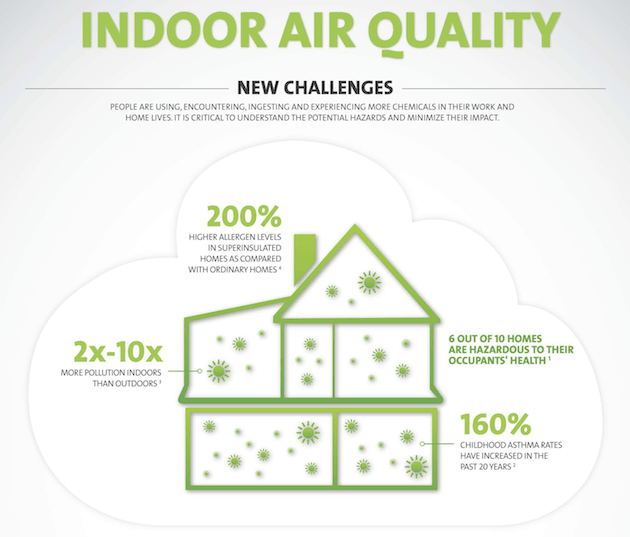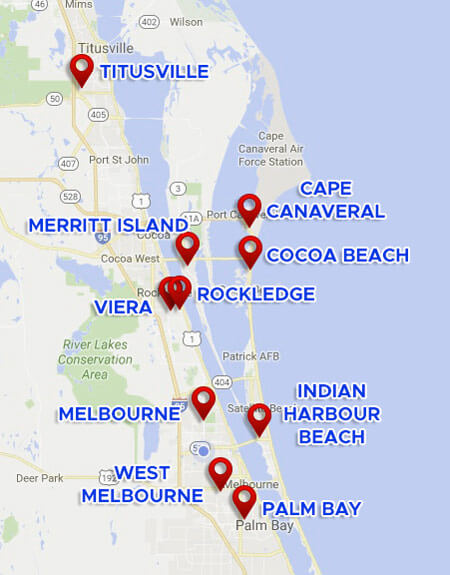Is Your Home’s Air Making You Sick? How to Improve Your Indoor Air Quality
Posted: September 11, 2015

The Environmental Protection Agency identifies the air inside the home as one of the top five environmental hazards. And in fact, the typical home’s air is much dirtier than the air outdoors, and that can pose a serious problem when it comes to managing respiratory ailments like asthma, allergies, and COPD.
The air in your home contains both gaseous contaminants and particulate pollutants. Gaseous contaminants come from sources like combustion appliances and the chemical solutions you use around the house as well as from synthetic materials in your home, like carpets and wood composites. Particulate pollutants, such as pollen, mold spores, and highly allergenic dust mite debris, typically come in from outside through windows and doors, or they hitch a ride on the soles of your shoes or on your pets’ fur.
While you can’t possibly rid your home of all pollutants, you can vastly improve your indoor air quality through a three-pronged approach that includes source control, ventilation, and air cleaning.
Controlling Pollutants at the Source
Source control is the first order of business when it comes to improving your indoor air quality. Here, your goal is to prevent contaminants from entering your home in the first place.
First, whenever it’s time to purchase new items for the home, from bedding or carpeting to a new dining room table, opt for items that are made of natural materials. Glues, dyes, paints, and other chemicals used in the manufacture of household goods off-gas harmful chemicals like formaldehyde, benzene, and other volatile organic compounds (VOCs).
Secondly, reduce your household chemical use whenever possible. All-purpose cleaners, window cleaners, and the like are major contaminants in the home, and in fact, they may do more harm than household dirt and grime, especially if you suffer from a respiratory condition. Instead of using these chemical solutions, opt for nontoxic store-bought cleansers, or use good old baking soda and vinegar or essential oils, many of which have naturally potent anti-microbial, anti-fungal, and anti-bacterial properties.
Other ways you can employ source control to clean up your indoor air include:
- Removing your shoes at the door to avoid tracking in pesticides, pollen, and other pollutants your soles pick up outdoors.
- Maintaining your combustion appliances to ensure emissions are within the healthy range. Have your gas furnace tuned up each fall have your gas water heater tuned up every couple of years.
- Open your windows whenever you must use chemicals indoors.
Ventilation is Critical
Ventilation is the exchange of stale indoor air for fresh outdoor air. Newer, tightly-sealed homes in particular can be terrible for your health if ventilation is inadequate, and that’s where a ventilation system can make a huge difference in your indoor air quality.
Supply ventilation systems utilize a fan to pressurize your house, which forces outside air inside through holes in the envelope, various fan ducts, and any vents installed for that purpose.
Exhaust ventilation systems depressurize your house, which forces stale indoor air outside and allows fresh air to seep inside through holes, fan ducts, and specialized vents.
Mechanical ventilators are more expensive to install, but they ensure proper ventilation while reducing the energy loss caused by unconditioned outdoor air entering your home. Energy recovery ventilators (ERVs) are ideal for Florida’s climate. An ERV brings in air from outside while removing stale air to the outdoors, but in the winter, heat from the outgoing air is transferred to the incoming air, and in the summer, the incoming air is cooled by the outgoing air. Additionally, the ERV will remove humidity from the incoming air in the summer and humidify it in the winter.
Other ways to improve ventilation in your home include using the exhaust fans in the kitchen and bathroom whenever you cook, shower, or use body care products and opening the windows whenever possible on nice days.
Air Cleaning Strategies
The third way to maintain healthy indoor air is to clean the air to remove particulate pollutants. The air filter in your HVAC system is your first defense against dirty air, because it traps harmful particles as air circulates through the system. The highest quality air filter your system will accommodate will ensure that more, smaller particles are removed from your air. However, even the highest quality HVAC air filter will allow a number of particles to pass through.
Whole-house air cleaners include heavy-duty filters that are built into the system to trap even the smallest particles that will pass right through the standard HVAC filter. Additionally, UV lights can be installed in your HVAC system to kill biological contaminants like pollen and mold.
Portable air cleaners can also go a long way toward keeping your home’s air healthier to breathe. Tabletop air cleaners are largely ineffective, but portable electronic air cleaners, which use electrostatic attraction to trap particles, can be effective for particularly dirty rooms and for keeping the bedroom air clean while you sleep.
Brevard Cooling and Heating Can Help!
If you suspect your home’s indoor air quality leaves a lot to be desired, we can test it and offer a number of solutions for improving its quality, based on our findings. If you’re like most Americans, you spend over 90 percent of your time indoors, and breathing clean air is essential for your good health. Contact us today at 321-757-9008 for more general information about indoor air quality or to schedule air quality testing with one of our highly skilled and knowledgeable technicians.
Have a specific Heating, Ventilating, & Air Conditioning related question?
Ask a Professional. We’re here to help! Call anytime day or night (321) 757-9008

